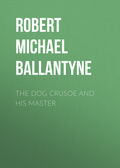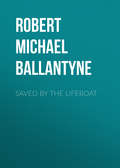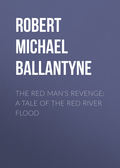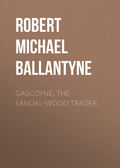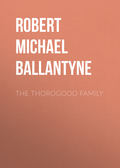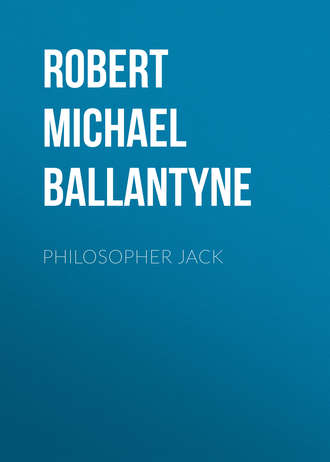
Robert Michael Ballantyne
Philosopher Jack
Chapter Ten
Change of Scene and Fortune
The fair wind that swept the good ship Rainbow away from California’s golden shores carried her quickly into a fresh and purer atmosphere, moral as well as physical. It seemed to most, if not all, of the gold-finders as if their brains had been cleared of golden cobwebs. They felt like convalescents from whom a low fever had suddenly departed, leaving them subdued, restful, calm, and happy.
“It’s more like a dream than a reality,” observed Ben Trench one day, as he and Polly sat on the after part of the vessel, gazing out upon the tranquil sea.
“What seems like a dream?” asked Philosopher Jack, coming aft at the moment with Watty Wilkins, and sitting down beside them.
“Our recent life in California,” replied Ben. “There was such constant bustle and toil, and restless, feverish activity, both of mind and body; and now everything is so calm and peaceful, and we are so delightfully idle. I can hardly persuade myself that it is not all a dream.”
“Perhaps it is,” said Philosopher Jack. “There are men, you know, who hold that everything is a dream; that matter is a mere fancy or conception, and that there is nothing real or actually in existence but mind.”
“Bah!” exclaimed Watty with contempt; “what would these philosophers say if matter, in the shape of a fist, were to hit them on their ridiculous noses?”
“They’d say that they only imagined a fist and fancied a blow, I suppose,” returned Jack.
“And would they say that the pain and the blood were imagination also?”
“I suppose they would.”
“But what if I were to come on them slily behind and hit them on their pates before they had a chance to see or to exert their terribly real and powerful minds?” demanded Watty.
“You must ask one of themselves, Watty, for I don’t know much about their views; indeed, I’m not sure that I have represented them correctly, though it’s very likely I have, for there is no species of nonsense under the sun that men have not been found to hold and defend with more or less vigour.”
“Would you not call that a proof of the Creator’s intention that man should exercise the investigative powers of his mind?” asked Ben.
“I would call it a proof of man’s depravity,” said Wilkins.
“What does Polly think?” asked Jack, with an amused look at the child, whose fair brow wore an anxious little frown as she tried to understand.
“I think it’s a proof of both,” replied Polly, with a blush and a laugh; “we have got the power to think and speak and reason, and we are sometimes very naughty.”
“Well said, Polly; we must call you the philosopher in future,” cried Watty. “But Jack,” he added, with a perplexed air, “it seems to me that we live in such a world of confusion, both as to the limited amount of our knowledge, and the extent of our differences of opinion, while presumptuous incapacity attempts to teach us on the one hand, and designing iniquity, or pure prejudice, seeks to mislead us on the other, and misconception of one’s meaning and motives all round makes such a muddle of the whole that—that—it seems to me the search after truth is almost hopeless, at least to ordinary minds.”
“I admit it to be a great difficulty,” replied Jack, “but it is by no means hopeless. We must not forget that the world is well supplied with extraordinary minds to keep the ordinary minds right.”
“True, but when the extraordinary minds differ, what are the poor ordinary ones to do?” asked Watty.
“Use their brains, Watty, use their brains,” said Captain Samson, who had come aft, and been listening to the conversation. “Your brains, whether good or bad, were given to be used, not to be sold. The power to reason is a gift that is not bestowed only on extraordinary minds. The unlearned are sometimes better reasoners than the learned, though, of course, they haven’t got so many tools to work with. Still, they are sufficiently furnished with all that’s needful to run the race that is set before them. God has given to every man—civilised and savage—a brain to think with, a heart to feel with, a frame to work with, a conscience to guide him, and a world, with all its wonderful stores, in which to do what he will. Conscience—which, I think, is well named the voice of God in man—tells him to do right, and forbids him to do wrong; his heart glows with a certain degree of pleasure when he does well, and sinks, more or less, when he does ill; his reason tells him, more or less correctly, what is right, and what is wrong. The Word of God is the great chart given to enlighten our understandings and guide us heavenward. As my reason tells me to go to my charts for safe direction at sea, so every man’s reason will tell him to go to God’s revealed Word, when he believes he has got it. There he will find that Jesus Christ is the centre of the Word, the sum and substance of it, that he cannot believe in or accept the Saviour except by the power of the Holy Spirit. He will also find the blessed truth that God has promised the Spirit to those who simply ‘ask’ for Him. There is no difficulty in all this. The great and numberless difficulties by which we are undoubtedly surrounded are difficulties of detail, which we may be more or less successful in solving, according to our powers of mind, coupled with our submission to the revealed will of God. To some extent we fail and get into trouble because we lazily, or carelessly, let other men think for us, instead of making use of other men’s thoughts to help us to think for ourselves. Depend upon it, Watty, we won’t be able to justify ourselves at the judgment day by saying that things were too deep for us, that things seemed to be in such a muddle that it was of no use trying to clear ’em up. Why, what would you say of the mainspring of a watch if it were suddenly to exclaim, ‘I’ll give up trying! Here am I—so powerful and energetic, and so well able to spin round—checked, and hindered, and harassed by wheels and pinions and levers, some going this way, and some going that way, all at sixes and sevens, and all for no good end that I can see, buried as I am in this dark hole and scarcely allowed to move at all?’ Would it be right or reasonable to charge the watchmaker with having made the watch in vain, or made it wrong? Of this I at least am convinced, that God is perfect, and that all things are working towards a good end, God’s sovereignty, our mysterious free-will and personal responsibility being among these ‘all things.’”
While Captain Samson was discoursing on these important subjects, the look-out on the forecastle reported a sail on the weather-bow.
“She’s a whaler, I do believe, and her boats are after a sperm whale,” said Simon O’Rook, who stood by the mizzen shrouds looking intently at her through his double glass. Simon, being now a rich man, had not only taken a cabin passage, but had bought for himself one of the best binocular telescopes to be had in San Francisco.
It was soon seen that O’Rook was right for the whale rose to blow, and swam towards the Rainbow, while the boats of the whaler immediately followed in pursuit.
Great was the excitement on board the Rainbow as the men clustered on the forecastle, or ran up the rigging, to watch the chase, while the officers and passengers got out their telescopes.
“Come here, Polly,” cried Jack; “look through my glass. It’s a rare chance you’ve got of seeing what men have to go through in order to send oil to market.”
Polly at once accepted the invitation. Jack assisted her to mount on the top of the capstan, and arranged the glass.
“There she blows!” shouted one of the men who had been an old whaler; “there she breaches!”
As he spoke the whale rose about three miles to windward of them, not far from the boat that led the chase. The men in the boat were seen to bend to their oars, as Captain Samson said, “with a will.” Another moment and the harpooneer stood up in the bow. The spectators were too far off to see the weapon used, but they could perceive the man’s action, and there was no possibility of mistake as to the result, when the tail of the enormous creature was suddenly flourished in the air, and came down on the sea like a clap of distant thunder.
“Oh! oh!!” shrieked the horrified Polly, “the boat is gone!”
But the boat was not gone. It had been quickly backed out of danger when the harpoon was thrown, and reappeared when the cataract of spray sent up had dispersed.
“He’s pouring water on the rope now,” said Jack, in a low excited voice, “to prevent its catching fire as it runs out. They’re fast to the fish.”
“Yes, I see,” exclaimed Polly, squeezing her right eye against the glass and shutting the other with her hand.
But in a few minutes there was no need for telescopes, as the whale came straight towards the Rainbow, dragging the boat after it, while the other boats followed as fast as the men could pull. The whale-ship steered in the same direction, but there was scarcely wind enough to fill her top-sails.
Suddenly the leviathan came to the surface for breath, not far off, and sent up a grand spout of water on the Rainbow’s starboard bows. The boat pulled quickly up, and another harpoon was sent deep into the whale’s side. It dived immediately, and, turning at an angle, darted off in an other direction. This time the excited onlookers could hear the cheer given by the whalers as the second “iron” was fixed, and replied to it with enthusiasm. Soon the boat was carried far away, and the telescopes became again necessary, but ere long the fish turned, and once more made for the ship. It could not have been more than five hundred yards distant when it came to the surface for the third time, and the harpooneer was distinctly seen to drive a lance deep into its side, from which fountains of blood flowed. He had struck its “life,” as whalemen express it, and the whale soon went into its dying struggles, in the course of which it hit the boat, stove in its side, and overturned it.
There was a cry of consternation on board the Rainbow at this. Instantly the order was given to lower the boats. Philosopher Jack and O’Rook sprang to obey, by an irresistible impulse, as if they had been part of the ship’s crew. In a few seconds two boats were rowing at full speed to the rescue, while the boats belonging to the whale-ship—still far distant—made for the scene of disaster.
Ere long the rescue party had the great satisfaction of picking up the wrecked whalers, and found that not a man among them had received greater injury than a bruise or two and a ducking. Their boat, however, was completely destroyed. They were therefore taken on board the Rainbow, while the whaler’s boats came up and secured their prize.
That night, while the stars twinkled at their own reflections in the sleeping sea, the crew of the whale-ship had a “gam” on board the Rainbow.
A “gam,” good reader, may be described as a “small tea-party” on the sea. But it differs in many respects from such gatherings on shore, inasmuch as the revellers are not “a few friends”, male and female, but are usually absolute strangers to each other, and of the male sex only. But the circumstances of their meeting—on the lone ocean, far from home and friends—have a marvellous effect in opening up the fountains of the human heart. The men and officers fraternised at once. The whalers were chiefly American, the Rainbowers principally English, with a slight mixture of Irish and Scotch. They all spoke the same language; that was enough. Soon after the arrival of their guests, powerful friendships were formed. While tea, or rather supper, was being discussed, these were cemented; and, when pipes were lit, confidences of the most touching nature were interchanged. Anecdotes and stories naturally followed the confidences, broke up the separate parties, and drew the company more together. The union was finally and effectually concentrated by one of the whalers’ crew making a demand for a song.
“Come, O’Rook,” cried one of the Rainbow men, “let’s have ‘The poor little pig wi’ the purple nose.’”
O’Rook began at once, and sang with such fervour and pathos, that his auditors became quite uproarious in their admiration. But when the Irishman called on the whalers for a ditty, a fine-looking youth sang a song of the “Homeward Bound,” in a voice so sweet and true, that the spirit of the men was changed, and many a moistened eye told that deep chords of sympathy had been touched.
“Can you play the fiddle?” asked one of the men of O’Rook, when the song was finished.
“Sure it’s myself can do that same,” he replied, with a modest air, which drew forth a peal of laughter. When the fiddle was produced and O’Rook struck up reels, and strathspeys, and hornpipes, with a precision of touch and time and perfection of tune that was far above the average of amateurs, the joy of the party could no longer find vent through eye and mouth. They were forced to open the safety-valves of heel and toe. For this purpose the quarter-deck was cleared, and flags were festooned round it; the officers joined, and Polly Samson was placed on the capstan, like the presiding angel of the scene.
Ah! reader, if you have not been for many months on the ocean, or in the lone wilderness, without seeing a new face, or hearing a sweet sound, or feeling the power of female influence, you cannot fully appreciate what we describe. There was no drink save coffee and tea at that feast. The Rainbow was a temperance ship. But the men required no spirits. Each one had more than sufficient within himself. The presence of Polly, too, had a powerful effect. Every man there saw his own particular Polly or Susan or Nancy in her pretty laughing face and sparkling eyes.
“Your men are powerful fellows,” said the captain of the Rainbow to the captain of the whaler; “I’ve no doubt they’ll be quite game for work to-morrow, though they should keep it up all night.”
“They certainly would,” replied the latter, “if called on to do duty; but they won’t be required to work to-morrow, for we keep the Sabbath on board of our ship as a duty we owe to God, and we find that we are great gainers in health and strength, while we are no losers of fish by doing so.”
“Ha! the great Captain Scoresby tried that before you, and said that he found keeping the Sabbath to be good both for body and soul,” said the captain of the Rainbow.
“I know he did,” replied the other, “and I am trying to follow in Scoresby’s wake.”
It was pretty late in the evening before the whalers could tear themselves away, and when at last they did so, they expressed a unanimous opinion that it had been the most successful gam they had ever had in their lives.
Not long after parting company from the whale-ship the Rainbow sailed into the cold and variable regions south of Cape Horn. Here they experienced what the men styled “very dirty weather.” The skies were seldom blue, and the decks were never dry, while it became necessary to keep the stove burning constantly in the cabin, and the berth-ports almost always shut.
The effect of all this on poor Ben Trench was to injure his health severely. His cough increased, and it soon became evident that his complaint, which at first had only threatened to grow worse, had now become chronic and serious.
“Watty,” he said one day, while his friend sat beside his cot reading to him, “it’s of no use shutting one’s eyes to facts. I fear that I am now hopelessly ill, and that I shall never see father or mother or Susan again in this world.”
“O Ben! don’t speak like that,” said Watty, laying down the book, and gently taking his friend’s thin hand in both of his. “You mustn’t do it. It will only make you worse. When we get out of this horrible region into the trade winds and the sunshine near the Line, you’ll be a new man. Come now, cheer up, Ben, and don’t let your good little nurse see you with such a sad face.”
Polly’s step was heard at the moment. She entered with a bowl of soup.
“Here, Ben, this will do you good,” she said, handing him the bowl. “The cook says it’s the stuff to stick to your ribs. There now, I can’t stop to give it you, for father wants me, but you’re all right when Watty’s by. Are you better?”
“Well, not much,” replied Ben with a smile; “but I’m always the better of seeing your little face. Don’t be long of returning, Poll.”
When she had left, Ben drank the soup, and then lay down with a sigh.
“It may be that the warm latitudes will do me good, Watty,” he said, “but I don’t feel as if they would. Still I’m resigned to God’s will, though it seems sad to die so young, and just when I’ve come to know my dear Redeemer, and might, perhaps, have done some little work for Him. It seems so strange to be saved and not allowed time to do anything.”
“You have done something,” returned his friend with an earnest look; “if I have really turned to Jesus at all, it has been through your influence, Ben, and I’m sure that Jack would say the same of himself; and if he and I are spared to do any good work for our Lord, it will be all owing to you.”
“Not to me, Watty, not to me,” rejoined Ben, with a glad look; “but if God’s holy Spirit has used me as an instrument in this, I shall have cause to praise Him for it throughout eternity. Oh! is it not strange that in a region where there is so little godliness, and while we were in the eager pursuit of gold, our eyes should have been opened to see and appreciate the true gold? But now, Watty,” he added in a lower tone, “I want to ask you to do me a favour. I want you to go yourself to our house, without delay, and break it to mother.”
He paused. Watty laid his face in the bedclothes, and wept silently.
“They are very fond of you,” continued Ben, “and I should not like them to hear of it from any one but you. Be very tender to Susan, Watty. Poor Susan, she will need comfort, and you know how to direct her.”
For some time Ben Trench continued talking, and then fell into a quiet slumber, in which his friend left him, while Polly watched by his side.
The warm latitudes did no good to the invalid. On the contrary, he suffered much from the heat, and became visibly weaker.
At last the shores of Old England drew nigh. A few days more and they should sight land. They sought to cheer him with this, but there was no answering sparkle in Ben’s eyes.
“Yes,” he said, faintly, “I shall see them all again, but not here.”
Ben was dying when the Rainbow approached the British Channel. The whole of the previous day a stiff gale had blown, and this had not much abated when night drew on. Liverpool was their port, and the captain carried on full sail—more than the good ship could well bear. It is not known whether he felt so sure of his course that he did not think it necessary to shorten sail on nearing the Land’s End, or that he was anxious, at all hazards, to reach port before Ben Trench should die, but he held on recklessly, and, in the dead of night, ran the Rainbow straight against the high cliffs not far from the Cornish town of Saint Just.
The wreck of the ship was complete in a few seconds. All her masts went over the side, and the waves overwhelmed her. She would have gone down in deep water if she had not been dashed between two rocks and held there. Time was thus given for one of the boats to be got out, but utter confusion reigned, for the captain had disappeared. No wonder that several of the men leaped into her, crying, “Every man for himself,” and endeavoured to cast off.
“Have you got Polly?” cried Jack, as he dimly saw a figure staggering through the turmoil of wind and whirling spray.
“All safe!” gasped Captain Samson.
Jack instantly jumped into the boat and found O’Rook struggling to prevent one of the men from cutting the hawser. Jack knocked the man down, and, hauling the boat close alongside, shouted, “Jump, Captain, jump!” The captain did so at the right moment, and alighted safely, though with great violence. Just then Watty Wilkins was seen striving to lift Ben Trench over the bulwark of the ship. It was impossible to render him assistance, though Jack tried to do so, for at the moment a towering billow fell on the deck and tore the invalid from his grasp. With a shriek of despair Watty fell back into the sea, but was caught by one of the men and hauled into the boat which was then cut adrift. It was not a moment too soon, for the next wave dashed their ship to pieces.
As it was impossible to effect a landing among perpendicular cliffs which were lashed by roaring breakers, they were obliged to push out to sea, where they rowed till daylight, and succeeded in reaching Penzance harbour.
Leaving the others to report the news, Jack and Wilkins started off along the coast to the scene of the wreck. They found the spot, but not a vestige was to be seen of what had so long been their home, save a few broken spars, here and there far down in the clefts of inaccessible rocks. A fisherman, however, told them that several bodies had been thrown into a little bay, and were then lying in a shed near the spot. Hastening thither, they found five lying side by side. Among them were those of poor Ben Trench and the captain of the ship—the one strong, stalwart and still ruddy in the face, the other attenuated and ghastly, as might have been expected of one who had, as it were, died a double death.
We will not dwell on the terrible scene. While Jack and Captain Samson remained to attend to the dead, Wilkins set off, without delay, to be first, if possible, in breaking the sad news to his friend’s family, according to promise.
In regard to the wreck, it is sufficient to say that she, with all her precious freight was scattered on the rugged coasts of Cornwall, and our adventurers stood once more on their native shores without even the means of paying their travelling expenses home. They did not like to speak of their invested wealth, fearing that their statements might be disbelieved. They therefore stood literally in the position of beggars.
In this extremity they found the hospitable men of Cornwall to be friends indeed and full of sympathy.



